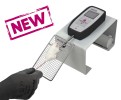Authors
S. Krishna, C. A. Dodd, S. K. Hekmatyar, N. M. Filipov
Lab
College of Veterinary Medicine, University of Georgia, Athens, USA
Journal
Archives of Toxicology
Abstract
Natural leaching processes and/or anthropogenic contamination can result in ground water concentrations of the essential metal manganese (Mn) that far exceed the current regulatory standards. Neurological consequences of Mn drinking water (DW) overexposure to experimental animals, i.e., mice, including its brain deposition/distribution and behavioral effects are understudied. Adult male C57BL/6 mice were exposed to Mn via the DW for 8 weeks. After 5 weeks of Mn exposure, magnetic resonance imaging revealed significant Mn deposition in all examined brain regions; the degree of Mn deposition did not increase further a week later. Behaviorally, early hyperactivity and more time spent in the center of the arenas in an open field test, decreased forelimb grip strength and less time swimming in a forced swim test were observed after 6 weeks of Mn DW exposure. Eight-week Mn DW exposure did not alter striatal dopamine, its metabolites, or the expression of key dopamine homeostatic proteins, but it significantly increased striatal 5-hydroxyindoleacetic acid (a serotonin metabolite) levels, without affecting the levels of serotonin itself. Increased expression (mRNA) of glial fibrillary acidic protein (GFAP, an astrocyte activation marker), heme oxygenase-1 and inducible nitric oxide synthase (oxidative and nitrosative stress markers, respectively) were observed 8 weeks post-Mn DW exposure in the substantia nigra. Besides mRNA increases, GFAP protein expression was increased in the substantia nigra pars reticulata. In summary, the neurobehavioral deficits, characterized by locomotor and emotional perturbations, and nigral glial activation associated with significant brain Mn deposition are among the early signs of Mn neurotoxicity caused by DW overexposure.
BIOSEB Instruments Used:
Grip strength test (BIO-GS3)

 Douleur - Allodynie/Hyperalgésie Thermique
Douleur - Allodynie/Hyperalgésie Thermique Douleur - Spontanée - Déficit de Posture
Douleur - Spontanée - Déficit de Posture Douleur - Allodynie/Hyperalgésie Mécanique
Douleur - Allodynie/Hyperalgésie Mécanique Apprentissage/Mémoire - Attention - Addiction
Apprentissage/Mémoire - Attention - Addiction Physiologie & Recherche Respiratoire
Physiologie & Recherche Respiratoire
 Douleur
Douleur Métabolisme
Métabolisme Système moteur
Système moteur Neurodégénérescence
Neurodégénérescence Thématiques transversales
Thématiques transversales Système musculaire
Système musculaire Functions de motricité générale
Functions de motricité générale Troubles de l'humeur
Troubles de l'humeur Other disorders
Other disorders Joints
Joints Système Nerveux Central (SNC)
Système Nerveux Central (SNC)  Système sensoriel
Système sensoriel
